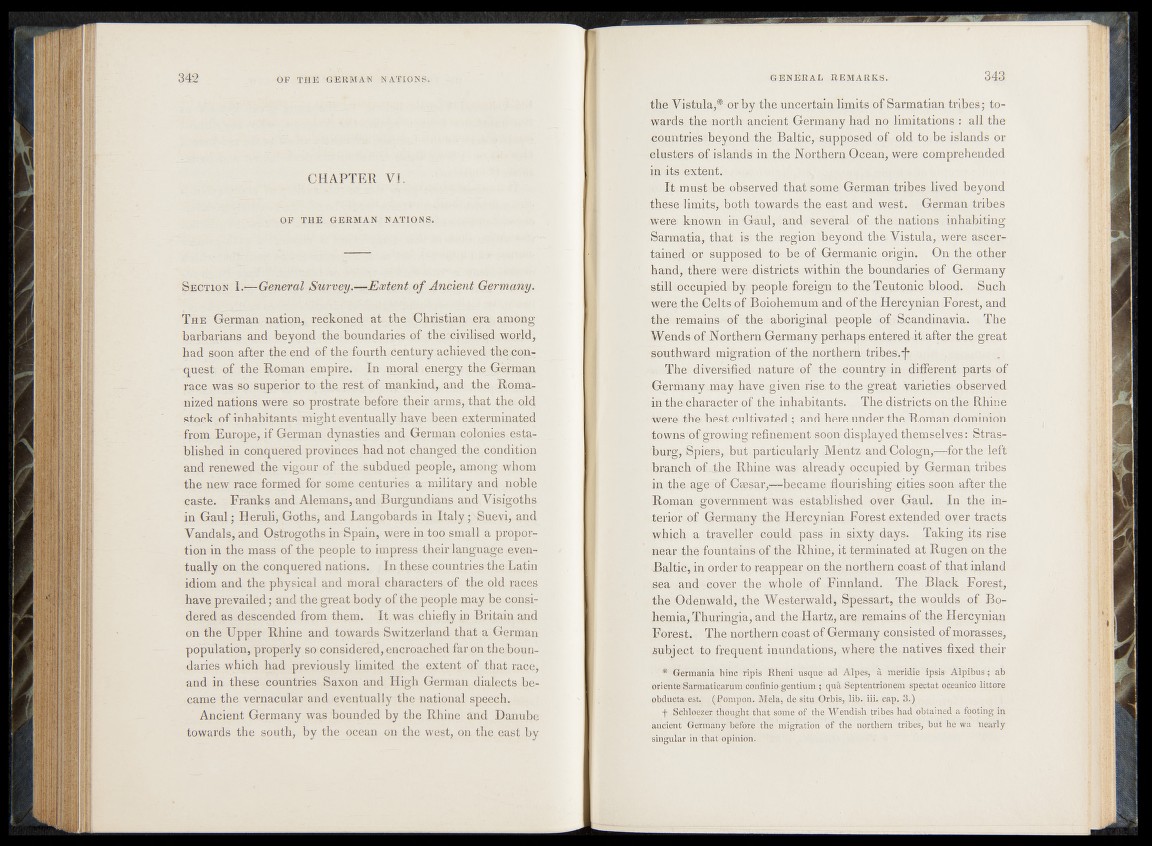
CHAPTER VI
OF THE_ GERMAN NATIONS.
S ection I.—General Survey.—^Extent o f Ancient Germany.
The German nation, reckoned at the Christian era among
barbarians and beyond itbe boundaries of thqxdvilised..world,
bad soon after the end of the fourth century achieved th&oon.-.
quest of the Roman empire. In moral »energy the German
race was so superior 'to'thj&fest ^jpnnkjnd* and ■ f ber,f Romn-
nized nations were so prostrate before their arm s, that, ±h©j.ol4
stock of inhabitants might eventually hay,e.been exterminated
from Europe, if German dynasties and German
blished in conquered provinces had not changed, the^onditipn
and renewed the vigour of the subdued people, amqng .whom
the new: race formed , for s o ^ rcenturie&^aTmilitary and noble
caste. Franks and Alemans, and Burgundians and Visigoths
in Gaul; Heruli, Goths, and Langobards in Italy jNisueyi, and
Vand als, and Ostrogoths in S pain, were in tqo small a proportion
in the mass of the people to impress their language eventually
on the conquered nations. In these countrief^ibe Batin
idiom and the physical and moral characters of the_old races
have,prevailed; and the great body of the people may be considered
a s. descended from them. It was chiefly in Britain and
on the Upper Rhine and towards, Switzerland that a German
population, properly so considered, encroached far on the.boun-
daries which had previously limited the extent of that race,
and in these countries Saxon and High German dialects be-
•came the vernacular and eventually the national speech.
Ancient Germany was bounded by the Rhine and Danube
towards the south, by the ocean on the west?. on the, east.by
the Vistula-/* orby the uncertain limits of Sarmatian tribes; towards,.
the north ancient Germany had no limitations : all the
countries beyond the, Baltic, supposed of old to.be islands or
elusters ef islands in thé Northern Ocean, were comprehended
in its extent.
«ri I t m-u§t'Jfeè^obseryed .that some1 German tribes lived beyond
éhese 1 imif &,v both^tdwar ds the east, and west. German tribes
were» known ih-Garul, and several* of .the .nations inhabiting
Sarmat-ia, that isf the irfegion^.eyond the, Vistula-; were ascertained
mr supposed fo:. ;bn*nf^Germanic origin, , On the other
ha-nd, i there wdre. districts within the boundaries of-Germany
still occupied* by. people foreign-to th@ Teutonic blood. ..Such
were the Units of Boiohemum and of the Hercynian Forest, and
the ‘remains of the aboriginal people o f; Scandinavia. The
Wends ofvNorthernJjiermany perhaps enfeiedritiafter the great
southward migration of tha;n.oriherii: tribes.-T
u The diversified nature'of the eountryin difihtentlpilrtsof
Kbrmany .may. have given rise. to. -the -great varieties observed
:-in thechara’cter.c^fe^ inhabitants...,, The disfMj^ hn.the Rhing
■were thebfest eultivatéd*and here under the Roman dominion
iifb-wns LQfegrowingTefinementi^dfil,dis,pla,ved 't heBaselve,S: ,Stra(s-
'burg#SpiefS, h u t ■ p a r t i c u l a r l y ^ a n d G l )tew>rirfor- tfle Jeft'
'branch olkihe Rhine was alveadw^psupied by German tribps
in thexage of :G8esar,^became flourishing ^tigg-pppnnRer.thé
Roman government^was established- joiv§r Gaul. In fh%'inr
jrerior of Germany the Hercynian F q ^ st extended. oyer tracts
which a traveller cQukbpossrin sixty days, , Taking ,it§( risp
near thé fountains o fthé Rhine, it terminated.at Riigep on.the
Baltic, in ordver to reappear Op the* northern coas^qf that inland
pea :and\cover the .whole Finnlapd. The Black Fpijegt,
the QdénV^ldfthis Westerwalfl, Spessart, the wqqlda.qf Re-
hernia, Thuringia,aud.,riie Hartz, arq remains p f the Herqynjan
i'biestt The.nprthern coast of Germany flqnsisted of.morasses,
subject to frequent inundarion^swhere fhe,natives;fixed their
* -riertnat>ia him iipfe Rheni usque ad Aïpls| d mferidie ‘ ipsis Alpibus; -ab
oriente Sarmaticarum confinio gentium ; quit Sè^tenWienem, spectut oeeanico littore
obducta- est. (Pompon. Mela, de situ Orbis, lib. iii. cap. 3.) ,
+ Schloezer thought that some of the Wendish tribes had obtained a footing in
ancient Germany before the migration of the northern tribes, but he wa Hearty-
singular in thabópihión.